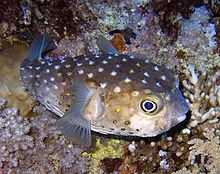Cyclichthys
From Wikipedia, the free encyclopedia
| Cyclichthys | |
|---|---|
 | |
| Cyclichthys spilostylus | |
| Scientific classification | |
| Kingdom: | Animalia |
| Phylum: | Chordata |
| Class: | Actinopterygii |
| Order: | Tetraodontiformes |
| Family: | Diodontidae |
| Genus: | Cyclichthys Kaup, 1855 [1] |
Members of the family Diodontidae, species of the genus Cyclicthys are usually known as swelltoads.
Distinguishing features
Fish of the genus Cyclicthys have three-rooted, rigid spines (actually modified scales) distributed over their bodies, and beak-like jaws, used to crush their hard-shelled prey (crustaceans and molluscs).[2] They differ from the porcupinefishes of the genus Diodon, which have moveable spines.
Defensive mechanisms
Like Tetraodontidae (blowfish) they have the ability to inflate themselves. Their inflated size combined with their spines make them extremely difficult to swallow. They may be poisonous, through the accumulation of tetrodotoxin or ciguatera.[2]
Species
There are currently three recognized species in this genus:[3]
- Cyclichthys hardenbergi (de Beaufort, 1939) (Hardenburg's burrfish)
- Cyclichthys orbicularis (Bloch, 1785) (Birdbeak burrfish)
- Cyclichthys spilostylus (Leis & J. E. Randall, 1982) (Spotbase burrfish)
References
- ↑ WoRMS (2012). "Cyclichthys Kaup, 1855". In Nicolas Bailly. FishBase. World Register of Marine Species. Retrieved April 17, 2012.
- ↑ 2.0 2.1 Lieske, E. and Myers, R. F. (2004) Coral reef guide; Red Sea London, HarperCollins ISBN 0-00-715986-2
- ↑ Froese, Rainer, and Daniel Pauly, eds. (2012). Species of Cyclicthys in FishBase. October 2012 version.
This article is issued from Wikipedia. The text is available under the Creative Commons Attribution/Share Alike; additional terms may apply for the media files.